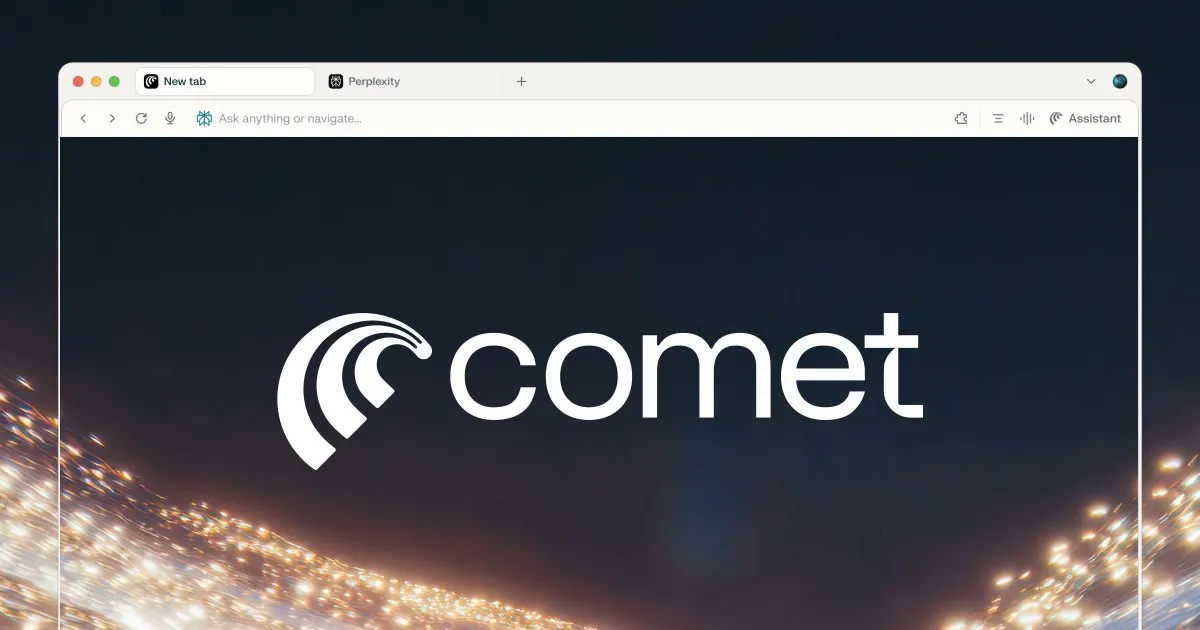Perplexity launches Comet, its AI-powered browser

Perplexity, the fast-rising AI startup known for its search engine technology, has officially launched its first web browser, Comet. The release marks the company’s most direct challenge yet to Google’s dominance in how people search and browse the internet. But rather than simply creating another browser, Perplexity is betting on artificial intelligence as the future of web navigation.
A Browser Built for AI Search
At its core, Comet is designed around Perplexity’s AI search engine, which delivers AI-generated summaries of search results instead of traditional blue links. This feature is set as the browser’s default, making Comet as much a search platform as a web browser. Initially, Comet will be available only to subscribers of Perplexity’s $200-per-month Max plan and a limited group of early users from a waitlist.
But Comet isn’t just about search. The browser also introduces Comet Assistant, an integrated AI agent designed to automate routine digital tasks. Accessible from a side panel on any webpage, Comet Assistant can analyze emails, summarize calendar events, manage browser tabs, and even navigate websites for you. It’s a bold vision of a browser where AI doesn’t just help you find information—it helps you act on it.
Reaching Users Without Google
Perplexity CEO Aravind Srinivas has openly positioned Comet as a critical piece of the company’s strategy to bypass Google. Rather than waiting for users to visit its AI search site, Perplexity wants to control the entire browsing experience. “If we become your default browser, that means infinite retention,” Srinivas said, highlighting the long-term value of users who engage directly with Perplexity’s ecosystem.
This move reflects a broader industry trend. Google itself has rolled out AI-powered features within Chrome, and startups like The Browser Company with its AI browser Dia, as well as rumored efforts by OpenAI, suggest that the AI-first browser is the next battleground in tech.
Early Impressions: Helpful but Flawed
Initial hands-on tests with Comet suggest that its AI agent has potential but still faces the same challenges that plague most AI assistants today. Comet Assistant works well for simple tasks, such as summarizing emails, managing your calendar, and answering context-aware questions about webpages you're viewing. Its ability to “see” what’s on your screen and respond accordingly can streamline workflows, removing the need to copy and paste between apps.
However, more complex tasks reveal the limits of current AI technology. For example, attempts to use Comet Assistant to book airport parking resulted in wrong dates and inaccurate follow-through, issues that echo common problems with other AI agents like OpenAI’s Operator.
Users should also be aware of the significant permissions required to unlock Comet Assistant’s full functionality. Granting Perplexity access to your emails, calendar, contacts, and even the ability to interact with your browser tabs and pages could raise privacy concerns, even if such access is necessary for the assistant to function effectively.
Can Perplexity Win the Browser War?
Comet is launching into a crowded space dominated by Chrome and Safari, with other AI-powered browsers like Dia also vying for attention. Still, Perplexity has momentum on its side. The company reported handling 780 million queries in May 2025 and claims month-over-month growth of over 20% for its AI search products.
Yet, getting users to switch browsers is notoriously difficult. Chrome’s market dominance isn’t just due to its search integration—it’s also a product of user habits, device defaults, and ecosystem lock-in. Comet’s innovative AI features may attract early adopters, but whether it can shift mainstream browsing habits remains an open question.
The Road Ahead
Perplexity’s Comet represents one of the boldest attempts yet to rethink the web browser around AI. While the technology is promising, reliability and user trust will be crucial hurdles. Until AI agents can consistently perform complex tasks without hallucinating or fumbling key details, their role will remain limited.
Still, Comet hints at a future where browsers do far more than display webpages—they’ll help users interpret, act on, and automate their online lives. Whether that future belongs to Perplexity or a more established player remains to be seen.





